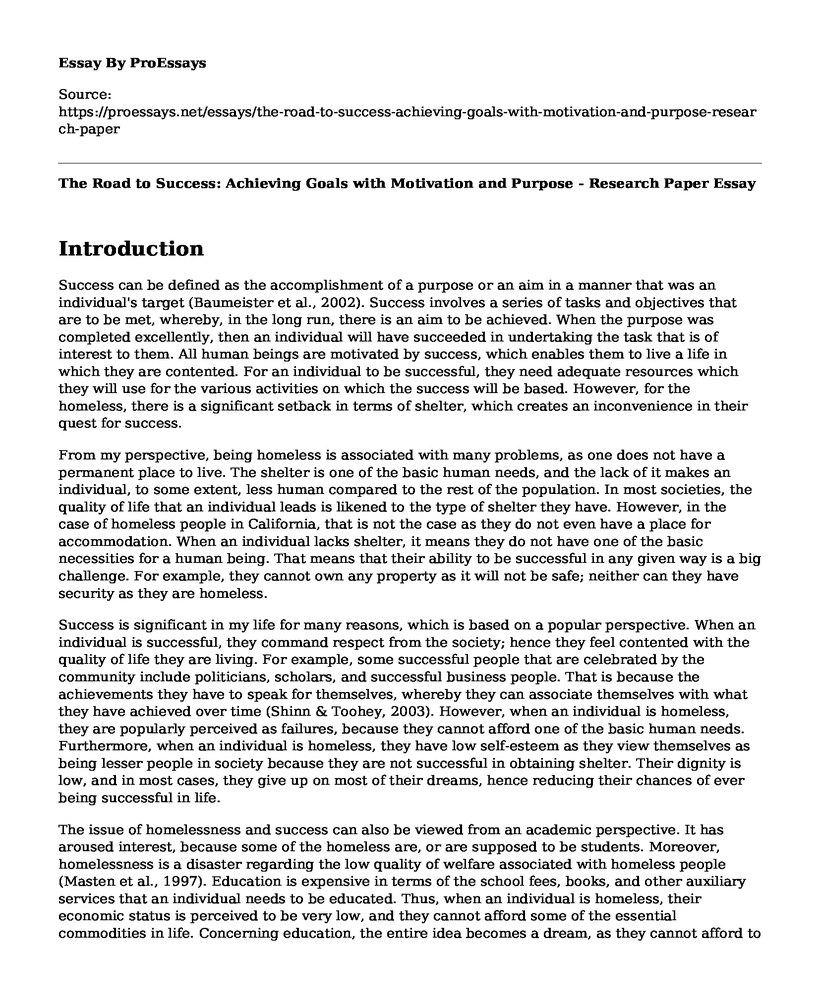Introduction
Success can be defined as the accomplishment of a purpose or an aim in a manner that was an individual's target (Baumeister et al., 2002). Success involves a series of tasks and objectives that are to be met, whereby, in the long run, there is an aim to be achieved. When the purpose was completed excellently, then an individual will have succeeded in undertaking the task that is of interest to them. All human beings are motivated by success, which enables them to live a life in which they are contented. For an individual to be successful, they need adequate resources which they will use for the various activities on which the success will be based. However, for the homeless, there is a significant setback in terms of shelter, which creates an inconvenience in their quest for success.
From my perspective, being homeless is associated with many problems, as one does not have a permanent place to live. The shelter is one of the basic human needs, and the lack of it makes an individual, to some extent, less human compared to the rest of the population. In most societies, the quality of life that an individual leads is likened to the type of shelter they have. However, in the case of homeless people in California, that is not the case as they do not even have a place for accommodation. When an individual lacks shelter, it means they do not have one of the basic necessities for a human being. That means that their ability to be successful in any given way is a big challenge. For example, they cannot own any property as it will not be safe; neither can they have security as they are homeless.
Success is significant in my life for many reasons, which is based on a popular perspective. When an individual is successful, they command respect from the society; hence they feel contented with the quality of life they are living. For example, some successful people that are celebrated by the community include politicians, scholars, and successful business people. That is because the achievements they have to speak for themselves, whereby they can associate themselves with what they have achieved over time (Shinn & Toohey, 2003). However, when an individual is homeless, they are popularly perceived as failures, because they cannot afford one of the basic human needs. Furthermore, when an individual is homeless, they have low self-esteem as they view themselves as being lesser people in society because they are not successful in obtaining shelter. Their dignity is low, and in most cases, they give up on most of their dreams, hence reducing their chances of ever being successful in life.
The issue of homelessness and success can also be viewed from an academic perspective. It has aroused interest, because some of the homeless are, or are supposed to be students. Moreover, homelessness is a disaster regarding the low quality of welfare associated with homeless people (Masten et al., 1997). Education is expensive in terms of the school fees, books, and other auxiliary services that an individual needs to be educated. Thus, when an individual is homeless, their economic status is perceived to be very low, and they cannot afford some of the essential commodities in life. Concerning education, the entire idea becomes a dream, as they cannot afford to pay for the costs of education. Even though an individual might be having the ability to learn and become successful, their economic status, which results in being homeless, does not allow them to pursue their dream in education. That has the effect of making them illiterate, and by extension, end up being unemployed in life. Later, their welfare is diminished, as they do not have a shot at success, which highlights the plight of the homeless people in California. Thus, it is evident that the homeless face multiple challenges, which makes it hard for them to succeed in life.
References
Baumeister, R. F., Leith, K. P., Muraven, M., & Bratslavsky, E. (2002). Self-regulation as a key to success in life. In Improving competence across the lifespan (pp. 117-132). Springer, Boston, MA. https://link.springer.com/chapter/10.1007%2F0-306-47149-3_9
Masten, A. S., Sesma Jr, A., Si-Asar, R., Lawrence, C., Miliotis, D., & Dionne, J. A. (1997). Educational risks for children experiencing homelessness. Journal of School Psychology, 35(1), 27-46. https://www.sciencedirect.com/science/article/pii/S0022440596000325
Shinn, M., & Toohey, S. M. (2003). Community contexts of human welfare. Annual review of psychology, 54(1), 427-459. https://hss.ucsf.edu/sites/hss.ucsf.edu/files/imported_pdf/article-shinn%20annurev.psych.54.101601.pdf
Cite this page
The Road to Success: Achieving Goals with Motivation and Purpose - Research Paper. (2023, Apr 09). Retrieved from https://proessays.net/essays/the-road-to-success-achieving-goals-with-motivation-and-purpose-research-paper
If you are the original author of this essay and no longer wish to have it published on the ProEssays website, please click below to request its removal:
- Research Proposal: The Effects of Verbal Abuse of Parents on Children's Personality and Behavior
- How Technology Has Changed the Work Place - Paper Example
- Nursing: From Female-Dominated to Gender-Neutral Profession - Essay Sample
- Guns on College Campuses: Should Concealed Weapons Be Allowed? - Research Paper
- Diversity at Work: Benefits, Challenges & Solutions - Essay Sample
- What Does It Mean to Be a US Citizen - Essay Sample
- Essay Example on Compensation in business







